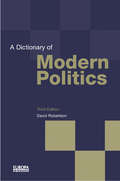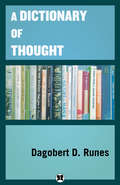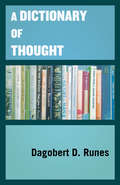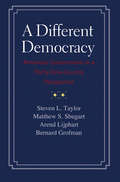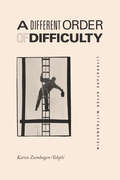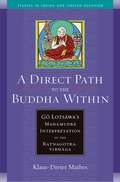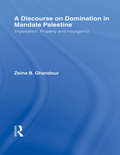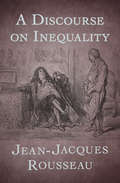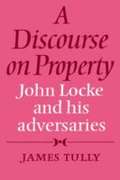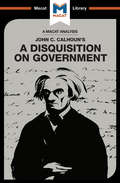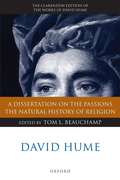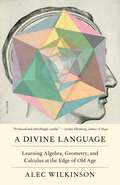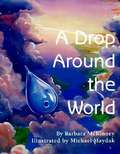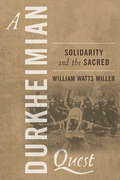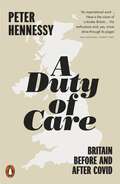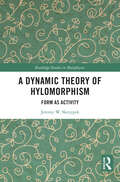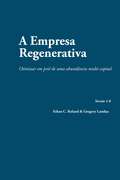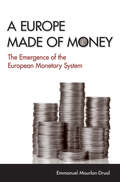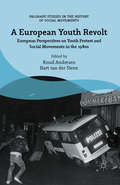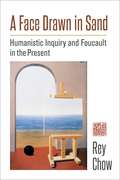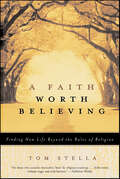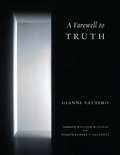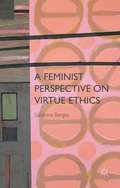- Table View
- List View
A Dictionary of Modern Politics
by David Professor RobertsonA comprehensive guide to the complex ideology/terminology which surrounds the world of politics.* Well over 500 extensive definitions* Defines political theories, dogmas and phraseologies* Terms such as Pacifism, Proportional Representation, Jihad, Son of Star Wars, Third Way and Consensual are explained clearly and succinctly* Invaluable for anyone concerned with politics or current affairs.
A Dictionary of Thought
by Karl Marx Dagobert D. RunesThis dictionary, from the pen of the well-known philosopher Dagobert D. Runes, is offered as an attempt to define the borderlines of human thinking and human morality. In 152 pages organized alphabetically, Dr. Runes has created a dictionary of his own philosophical musings indexed by evocative words. Each word is followed by up to several single sentence aphorisms and occasionally a short essay. As a collection, they cover an extremely broad range of topics. In his search for real verities and true humanity, he takes the reader on an arduous thought-provoking voyage through the depths of the mind. This type of soul-searching philosophy, unburdened by traditional manner and terminology, is sometimes baffling, frequently of melancholy character, but almost always fascinating and inspiring.
A Dictionary of Thought
by Dagobert D. RunesAn A-to-Z collection of thoughtful aphorisms and ruminations by the philosopher and founder of the Philosophical Library. In this unique dictionary, philosopher Dagobert D. Runes attempts to define the contours of human thinking and morality. In a series of terms organized alphabetically, Runes systematically sets out his own musings on topics ranging from Abhorrence and Ability to Zeal, Zen, and Zero. Each word is followed by up to several single-sentence aphorisms and occasionally a short essay. In his search for real verities and true humanity, Runes takes the reader on a thought-provoking voyage through the depths of the human mind. This is philosophy as intellectual soul-searching, unburdened by traditional manner and terminology. Sometimes baffling and frequently melancholy, it is always fascinating and inspiring.
A Different Democracy
by Bernard Grofman Arend Lijphart Steven L. Taylor Matthew Soberg ShugartFour distinguished scholars in political science analyze American democracy from a comparative point of view, exploring how the U.S. political system differs from that of thirty other democracies and what those differences ultimately mean for democratic performance. This essential text approaches the following institutions from a political engineering point of view: constitutions, electoral systems, and political parties, as well as legislative, executive, and judicial power. The text looks at democracies from around the world over a two-decade time frame. The result is not only a fresh view of the much-discussed theme of American exceptionalism but also an innovative approach to comparative politics that treats the United States as but one case among many. An ideal textbook for both American and comparative politics courses.
A Different Kind of Luxury
by Andy CouturierRaised in the tumult of Japan's industrial powerhouse, the eleven men and women profiled in this book have all made the transition to sustainable, fulfilling lives. They are today artists, philosophers, and farmers who reside deep in the mountains of rural Japan. Their lives may be simple, yet they are surrounded by the luxuries of nature, art, contemplation, delicious food, and an abundance of time. For example: Atsuko Watanabe is an environmentalist and home-schooler who explores Christian mysticism while raising her two daughters in an old farmhouse Akira Ito is an ex-petroleum engineer who has become a painter and children's book illustrator and explores the role of chi (life energy) in the universe through art and music Kogan Murata grows rice and crafts elegant bamboo flutes that he plays for alms in the surrounding villages Jinko Kaneko is a fine artist and fabric dyer who runs a Himalayan-style curry restaurant in the Japan Alps By presenting the journeys of these ordinary--yet exceptional--people, Andy Couturier shows how we too can travel a meaningful path of living simply, with respect for our communities and our natural resources. When we leave behind the tremendous burdens of wage labor, debt, stress, and daily busyness, we grow rich in a whole new way. These Japanese are pioneers in a sense; drawing on traditional Eastern spiritual wisdom, they have forged a new style of modernity, and in their success is a lesson for us all: live a life that matters.Andy Couturier is an essayist, poet, and writing teacher. He lived in Japan for four years where he taught, was a journalist, and worked on environmental causes. He lives in the San Francisco Bay Area.
A Different Order of Difficulty: Literature after Wittgenstein
by Karen Zumhagen-YekpléIs the point of philosophy to transmit beliefs about the world, or can it sometimes have higher ambitions? In this bold study, Karen Zumhagen-Yekplé makes a critical contribution to the “resolute” program of Wittgenstein scholarship, revealing his Tractatus Logico-Philosophicus as a complex, mock-theoretical puzzle designed to engage readers in the therapeutic self-clarification Wittgenstein saw as the true work of philosophy. Seen in this light, Wittgenstein resembles his modernist contemporaries more than might first appear. Like the literary innovators of his time, Wittgenstein believed in the productive power of difficulty, in varieties of spiritual experience, in the importance of age-old questions about life’s meaning, and in the possibility of transfigurative shifts toward the right way of seeing the world. In a series of absorbing chapters, Zumhagen-Yekplé shows how Kafka, Woolf, Joyce, and Coetzee set their readers on a path toward a new way of being. Offering a new perspective on Wittgenstein as philosophical modernist, and on the lives and afterlives of his indirect teaching, A Different Order of Difficulty is a compelling addition to studies in both literature and philosophy.
A Direct Path to the Buddha Within
by Klaus-Dieter MathesMaitreya's Ratnagotravibhaga, also known as the Uttaratantra, is the main Indian treatise on buddha nature, a concept that is heavily debated in Tibetan Buddhist philosophy. In A Direct Path to the Buddha Within, Klaus-Dieter Mathes looks at a pivotal Tibetan commentary on this text by Go Lotsawa Zhonu Pal, best known as the author of the Blue Annals. Go Lotsawa, whose teachers spanned the spectrum of Tibetan schools, developed a highly nuanced understanding of buddha nature, tying it in with mainstream Mahayana thought while avoiding contested aspects of the so-called empty-of-other (zhentong) approach. In addition to translating key portions of Go Lotsawa's commentary, Mathes provides an in-depth historical context, evaluating Go's position against those of other Kagyu, Nyingma, and Jonang masters and examining how Go Lotsawa's view affects his understanding of the buddha qualities, the concept of emptiness, and the practice of mahamudra.
A Discourse on Domination in Mandate Palestine: Imperialism, Property and Insurgency
by Zeina B. GhandourBritish discourse during the Mandate, with its unremitting convergence on the problematic ‘native question’, and which rested on racial and cultural theories and presumptions, as well as on certain givens drawn from the British class system, has been taken for granted by historians. The validity of cultural representations as pronounced within official correspondence and colonial laws and regulations, as well as within the private papers of colonial officials, survives more or less intact. There are features of colonialism additional to economic and political power, which are glaring yet have escaped examination, which carried cultural weight and had cultural implications and which negatively transformed native society. This was inevitable. But what is less inevitable is the subsequent collusion of historians in this, a (neo-) colonial dynamic. The continued collusion of modern historians with racial and cultural notions concerning the rationale of European rule in Palestine has postcolonial implications. It drags these old notions into the present where their iniquitous barbarity continues to manifest. This study identifies the symbolism of British officials’ discourse and intertwines it with the symbolism and imagery of the natives’ own discourse (from oral interviews and private family papers). At all times, it remains allied to those writers, philosophers and chroniclers whose central preoccupation is to agitate and challenge authority. This, then, is a return to the old school, a revisiting of the optimistic, vibrant rhetoric of those radicals who continue to inspire post and anti-colonial thinking. In order to dismantle, and to undo and unwrite, A Discourse on Domination in Mandate Palestine holds a mirror up to the language of the Mandatory by counteracting it with its own integrally oppositional discourse and a provocative rhetoric.
A Discourse on Inequality: A Discourse On The Origin Of Inequality, And A Discourse On Political Economy
by Jean-Jacques RousseauA fascinating examination of the relationship between civilization and inequality from one of history&’s greatest minds The first man to erect a fence around a piece of land and declare it his own founded civil society—and doomed mankind to millennia of war and famine. The dawn of modern civilization, argues Jean-Jacques Rousseau in this essential treatise on human nature, was also the beginning of inequality. One of the great thinkers of the Enlightenment, Rousseau based his work in compassion for his fellow man. The great crime of despotism, he believed, was the raising of the cruel above the weak. In this landmark text, he spells out the antidote for man&’s ills: a compassionate revolution to pull up the fences and restore the balance of mankind. This ebook has been professionally proofread to ensure accuracy and readability on all devices.
A Discourse on Property: John Locke and his Adversaries
by James TullyJohn Locke's theory of property is perhaps the most distinctive and the most influential aspect of his political theory. In this book James Tully uses an hermeneutical and analytical approach to offer a revolutionary revision of early modern theories of property, focusing particularly on that of Locke.
A Disquisition on Government
by Etienne Stockland Jason XidiasNineteenth-century American politician John C. Calhoun occupies a paradoxical place in the history of political thought – and of critical thinking. On one hand, he is remembered as a committed advocate of slavery, consistently espousing views that are now considered indefensible and abhorrent. On the other, the political theories that Calhoun used to defend the social injustice of slavery have become the basis of the very systems by which modern democracies defend minority rights. Despite being crafted in defence of a system as unjust as slavery, the arguments that Calhoun expressed about minority rights in democracies in A Disquisition On Government remain an excellent example of how problem solving skills and reasoning can come together. The problem, for Calhoun, was both specific and general. As matters stood in the late 1840s, the majority of American states were anti-slavery, with only the minority, Southern states remaining pro-slavery. This boiled down to a crucial issue with democracy: the US government should not, Calhoun argued, only respect the wishes of the majority. Instead, democratic government must aim to harmonize diverse groups and their interests – governing, in so far as possible, for everyone. His analysis of how the Southern states could protect what he saw as their right to keep slaves led Calhoun to formulate solutions to the problem of ‘the tyranny of the majority’ that have since helped defend far worthier minority views.
A Dissertation On The Passions: The Natural History Of Religion
by David Hume Tom L. BeauchampDavid Hume (1711-1776) is one of the greatest of philosophers. Today he probably ranks highest of all British philosophers in terms of influence and philosophical standing. His philosophical work ranges across morals, the mind, metaphysics, epistemology, religion, and aesthetics; he had broadinterests not only in philosophy as it is now conceived but in history, politics, economics, religion, and the arts. He was a master of English prose. <P><P> The Clarendon Hume Edition will include all of his works except his History of England and minor historical writings. It is the only thorough critical edition, and will provide a far more extensive scholarly treatment than any previous editions. This edition (which has been in preparation since the 1970s) offers authoritative annotation, bibliographical information, and indexes, and draws upon the major advances in textual scholarship that have been made since the publication of earlier editions--advances both in the understanding of editorial principle and practice and in knowledge of the history of Hume's own texts. <P> In this volume, Tom Beauchamp presents two essays from Four Dissertations (1757), the last philosophical work written by Hume, which was subsequently revised by the philosopher in the remaining years of his life. Whilst the bulk of A Dissertation on the Passions was extracted from passages in ATreatise of Human Nature, The Natural History of Religion was an original work when published in 1757, as well as the only major work devoted exclusively to the subject of religion that Hume published in his lifetime. Together with Hume's earlier work on religious topics, this essay drewconsiderable philosophical commentary from his contemporaries. The last edition of the two works in this volume seen through the press by Hume himself appeared in 1772. It provides the copy-text for this critical edition. The Editor's primarily historical Introduction discusses the genesis, revision, and reception of these two dissertations, which went into ten editions at the author's hand. It will appeal to scholars across many disciplines.
A Divine Language: Learning Algebra, Geometry, and Calculus at the Edge of Old Age
by Alec WilkinsonA New York Times Book Review Editors' Choice"Wilkinson has accomplished something more moving and original, braiding his stumbling attempts to get better at math with his deepening awareness that there’s an entire universe of understanding that will, in some fundamental sense, forever lie outside his reach." —Jennifer Szalai, The New York Times "There is almost no writer I admire as much as I do Alec Wilkinson. His work has enduring brilliance and humanity.” —Susan Orlean, author of The Library Book A spirited, metaphysical exploration into math's deepest mysteries and conundrums at the crux of middle age.Decades after struggling to understand math as a boy, Alec Wilkinson decides to embark on a journey to learn it as a middle-aged man. What begins as a personal challenge—and it's challenging—soon transforms into something greater than a belabored effort to learn math. Despite his incompetence, Wilkinson encounters a universe of unexpected mysteries in his pursuit of mathematical knowledge and quickly becomes fascinated; soon, his exercise in personal growth (and torture) morphs into an intellectually expansive exploration.In A Divine Language, Wilkinson, a contributor to The New Yorker for over forty years, journeys into the heart of the divine aspect of mathematics—its mysteries, challenges, and revelations—since antiquity. As he submits himself to the lure of deep mathematics, he takes the reader through his investigations into the subject’s big questions—number theory and the creation of numbers, the debate over math’s human or otherworldly origins, problems and equations that remain unsolved after centuries, the conundrum of prime numbers. Writing with warm humor and sharp observation as he traverses practical math’s endless frustrations and rewards, Wilkinson provides an awe-inspiring account of an adventure from a land of strange sights. Part memoir, part metaphysical travel book, and part journey in self-improvement, A Divine Language is one man’s second attempt at understanding the numbers in front of him, and the world beyond.
A Drop Around the World
by Barbara Shaw Mckinney Michael S. MaydakPresents the water cycle through the journey of a raindrop around the world, in sky, on land, underground, and in the sea, in its liquid, solid, and vapor forms, as it supports life everywhere.
A Durkheimian Quest
by William Watts MillerDurkheim, in his very role as a 'founding father' of a new social science, sociology, has become like a figure in an old religious painting, enshrouded in myth and encrusted in layers of thick, impenetrable varnish. This book undertakes detailed, up-to-date investigations of Durkheim's work in an effort to restore its freshness and reveal it as originally created. These investigations explore his particular ideas, within an overall narrative of his initial problematic search for solidarity, how it became a quest for the sacred and how, at the end of his life, he embarked on a project for a new great work on ethics. A theme running through this is his concern with a modern world in crisis and his hope in social and moral reform. Accordingly, the book concludes with a set of essays on modern times and on a crisis that Durkheim thought would pass but which now seems here to stay.
A Duty of Care: Britain Before and After Covid
by Peter HennessyOne of our most celebrated historians shows how we can use the lessons of the past to build a new post-covid society in BritainThe 'duty of care' which the state owes to its citizens is a phrase much used, but what has it actually meant in Britain historically? And what should it mean in the future, once the immediate Covid crisis has passed?In A Duty of Care, Peter Hennessy divides post-war British history into BC (before covid) and AC (after covid). He looks back to Sir William Beveridge's classic identification of the 'five giants' against which society had to battle - want, disease, ignorance, squalor and idleness - and laid the foundations for the modern welfare state in his wartime report. He examines the steady assault on the giants by successive post-war governments and asks what the comparable giants are now. He lays out the 'road to 2045' with 'a new Beveridge' to build a consensus for post-covid Britain with the ambition and on the scale that was achieved by the first.
A Dynamic Theory of Hylomorphism: Form as Activity (Routledge Studies in Metaphysics)
by Jeremy W. SkrzypekThis book introduces a novel hylomorphic theory of material objects, according to which material objects are understood as comprised or composed of both matter and activity, where activity plays the role of form. This theory, “hyloenergeism,” captures the dynamic nature of many of the objects of our experience, such as living organisms, better than other leading varieties of contemporary hylomorphism.Hylomorphism is the theory according to which material objects are understood as comprised or composed of two fundamental parts, components, aspects, or principles: matter and form. Many contemporary hylomorphists endorse a version according to which the form of a material object is understood as a certain kind of complex relation or structure realized in its material parts. Others endorse a version according to which the form of a material object is understood as a certain kind of power or disposition continuously activated in the object or in its material parts. This book argues against structural and dispositional varieties of hylomorphism in favor of a third approach: hyloenergeism. Drawing on various aspects of traditional Aristotelian hylomorphism and other contemporary occurrence-based theories of material objects, it argues that hyloenergeism has the resources to successfully avoid or resolve several major concerns for other competing hylomorphic views.A Dynamic Theory of Hylomorphism will appeal to researchers and graduate students working in metaphysics, ancient philosophy, and medieval philosophy.
A Empresa Regenerativa
by Patrícia Pinto Ethan Roland Gregory LanduaAs 8 Formas de Capital: Um novo modelo financeiro em prol de uma abundância otimizada Num mundo de sistemas ecológicos e sociais danificados, com uma economia global fragilizada e com as constantes alterações climáticas, o negócio tal como o conhecemos, poderá desenvolver-se, mas também pode correr o risco de não conseguir sobreviver. Nada é mais aceitável do que alcançar os lucros financeiros, extrair proveitos abundantes e proporcionar uma boa prosperidade que é fundamental aos nossos terrenos e fontes de água. As empresas precisam de um novo modelo com o qual possam abordar, de uma forma mais abrangente, o mundo e dar importância à necessidade da introdução de um processo novo no sistema enquanto se elucidam as pessoas nas tomadas de decisão mais relevantes. As 8 Formas de Capital é o modelo a seguir. Ao articularmos estas formas múltiplas de capital nas transações diárias, estamos a abrir portas a uma realidade mais abrangente sobre os lucros e sobre a economia. A Empresa Regenerativa define a diferença existente entre os sistemas degenerativos, os sustentáveis e os regenerativos. Também articula os quatro fatores da empresa regenerativa e os princípios para a concepção de empresa ecológica regenerativa. O Instituto "Regenerative Enterprise Institute", ou o seu representante em Portugal, também oferece serviços de formação e consultoria às empresas e corporações que querem adaptar-se e aderir à resolução dos sistemas regenerativos.
A Europe made of money: the emergence of the European Monetary System
by Emmanuel Mourlon-DruolA Europe Made of Money is a new history of the making of the European Monetary System (EMS), based on extensive archive research. Emmanuel Mourlon-Druol highlights two long-term processes in the monetary and economic negotiations in the decade leading up to the founding of the EMS in 1979. The first is a transnational learning process involving a powerful, networked European monetary elite that shaped a habit of cooperation among technocrats. The second stresses the importance of the European Council, which held regular meetings between heads of government beginning in 1974, giving EEC legitimacy to monetary initiatives that had previously involved semisecret and bilateral negotiations. The interaction of these two features changed the EMS from a fairly trivial piece of administrative business to a tremendously important political agreement.The inception of the EMS was greeted as one of the landmark achievements of regional cooperation, a major leap forward in the creation of a unified Europe. Yet Mourlon-Druol's account stresses that the EMS is much more than a success story of financial cooperation. The technical suggestions made by its architects reveal how state elites conceptualized the larger project of integration. And their monetary policy became a marker for the conception of European identity. The unveiling of the EMS, Mourlon-Druol concludes, represented the convergence of material interests and symbolic, identity-based concerns.
A European Youth Revolt: European Perspectives on Youth Protest and Social Movements in the 1980s (Palgrave Studies in the History of Social Movements)
by Bart van der SteenDuring the early 1980s, large parts of Europe were swept with riots and youth revolts. Radicalised young people occupied buildings and clashed with the police in cities such as Zurich, Berlin and Amsterdam, while in Great Britain and France, 'migrant' youths protested fiercely against their underprivileged position and police brutality. Was there a link between the youth revolts in different European cities, and if so, how were they connected and how did they influence each other? These questions are central in this volume. This book covers case studies from countries in both Eastern and Western Europe and focuses not only on political movements such as squatting, but also on political subcultures such as punk, as well as the interaction between them. In doing so, it is the first historical collection with a transnational and interdisciplinary perspective on youth, youth revolts and social movements in the 1980s.
A Face Drawn in Sand: Humanistic Inquiry and Foucault in the Present
by Rey ChowLeadership, innovation, diversity, inclusiveness, sharing, accountability—such is the resounding administrative refrain we keep hearing in the contemporary Western university. What kinds of benefits does this refrain generate? For whom? What discursive incitements undergird such benefits? Although there are innumerable discussions of Michel Foucault in the English-speaking academy, seldom is his work used systematically to unravel the dead ends and potentialities of humanistic inquiry as embedded in these simple but dynamic questions.Rey Chow takes up this challenge by articulating the plight of the humanities in the age of global finance and neoliberal mores through a resharpened focus on Foucault’s concept “outside.” This general discussion is followed by a series of micro-arguments about several loosely linked topics: the biopolitics of literary study, visibilities and invisibilities, race and racism, sound/voice/listening, and confession and self-entrepreneurship. Against what she polemicizes as the moralistic-entrepreneurial norming of knowledge production, Chow foregrounds a nonutilitarian approach, stressing anew the intellectual and pedagogical objectives fundamental to humanistic inquiry: How to process, analyze, and evaluate different types of texts across languages and disciplines; how to form and sustain viable arguments; how to rethink familiar problems through less known as well as very well-known sources, figures, and methods. Above all, she asks in an abidingly humanistic spirit, how not to know all the answers before the questions have been posed.
A Faith Worth Believing: Finding New Life Beyond the Rules of Religion
by Tom StellaHow can we have an authentic faith when we no longer have well-defined, codified beliefs? Where do we turn to better understand our relationship with God when the messages of the Church seem simplistic? This book is for all those who are asking the tough questions and are not satisfied with the answers they are receiving.
A Farewell to Truth
by William Mccuaig Gianni Vattimo Robert T. ValgentiThe provocative philosopher welcomes an era of a more open, democratic notion of truth.
A Farewell to Truth
by Gianni VattimoWith Western cultures becoming more pluralistic, the question of "truth" in politics has become a game of interpretations. Today, we face the demise of the very idea of truth as an objective description of facts, though many have yet to acknowledge that this is changing.Gianni Vattimo explicitly engages with the important consequences for democracy of our changing conception of politics and truth, such as a growing reluctance to ground politics in science, economics, and technology. Yet in Vattimo's conception, a farewell to truth can benefit democracy, exposing the unspoken issues that underlie all objective claims. The end of absolute truth challenges the legitimacy of policies based on perceived objective necessities-protecting the free market, for example, even if it devastates certain groups or classes. Vattimo calls for a truth that is constructed with consensus and a respect for the liberty of all. By taking into account the cultural paradigms of others, a more "truthful" society-freer and more democratic-becomes possible. In this book, Vattimo continues his reinterpretation of Christianity as a religion of charity and hope, freeing society from authoritarian, metaphysical dogmatism. He also extends Nietzsche's "death of God" to the death of an authoritarian God, ushering in a new, postreligious Christianity. He connects the thought of Martin Heidegger, Karl Marx, and Karl Popper with surprising results and accommodates modern science more than in his previous work, reconciling its validity with an insistence that knowledge is interpretive. Vattimo's philosophy justifies Western nihilism in its capacity to dispense with absolute truths. Ranging over politics, ethics, religion, and the history of philosophy, his reflections contribute deeply to a modern reconception of God, metaphysics, and the purpose of reality.
A Feminist Perspective on Virtue Ethics
by Sandrine BergesA Feminist Perspective on Virtue Ethics provides of historical survey of feminist virtue ethics, and shows how the ethical theorizing of women in the past can be brought to bear on that of women in the present.
